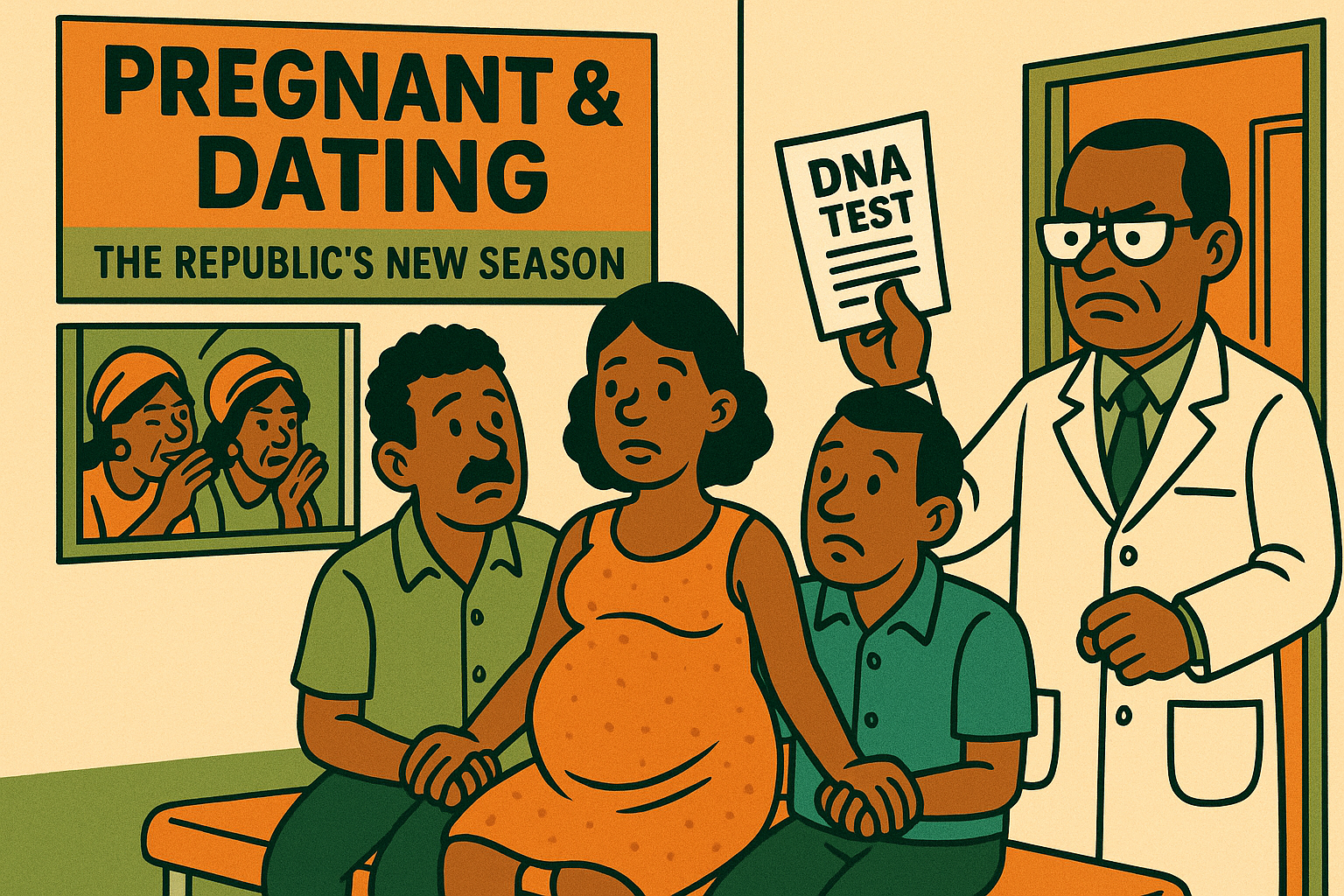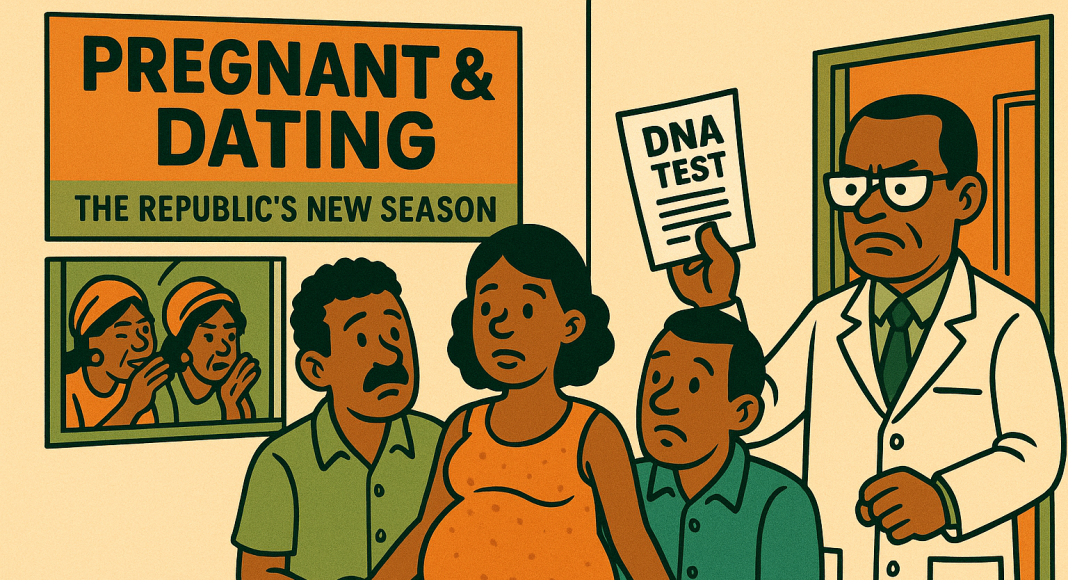
Pregnant and Dating in Ghana — The Republic’s New Season of DNA Dramas
By Jimmy Aglah •
Pregnant and dating in Ghana is the Republic’s new season of real-life drama: DNA as the village elder, paternity like a lotto draw, and belly bumps before wedding bands. Aunties have retired; the lab now confirms fatherhood. This isn’t just a love triangle — it’s a maternity-ward mystery with bonus episodes and no season finale in sight.
Articles from the Republic of Uncommon Sense may include affiliate links. If you buy through them, we may earn a small commission — at no extra cost to you.
It keeps our green-and-orange pens full of ink and our satire well-seasoned.
Once upon a time — in the Republic of Uncommon Sense, where gossip outruns electricity and scandal is sweeter than iced water — a pot quietly simmering with moral confusion finally boiled over, splashing society with questions no one wants to answer. Pregnant & Dating is the nation’s newest binge, a street-level soap nobody admits to watching but everybody narrates with professional confidence. In this show, belly size does not slow the heart or the hunt; love letters still go out while lullabies are under construction. While an unborn child dreams of the first cry, mama dreams of a new boyfriend to buy the diapers.
In this Republic, the moral lines are not merely blurred — they are trodden underfoot by youthful hormones and aging hypocrisy. Once upon a time, a pregnant girl knew her midwife better than her man. Today, the midwife needs a queue system — so many fathers waiting for DNA tickets like lotto numbers. And DNA? Once an elite tool for foreign crime shows — now it sits here as our village elder. Aunties who used to sniff out paternity with folded arms and pursed lips have retired. Science does the job now, printing truth in black and white. The shame? It comes free — as does the disbelief when lab results knock politely on the door of yet another unsuspecting Romeo.
You would think this Republic would pause and reflect, but no — the plot thickens faster than Ghanaian stew on a coal pot. Girls, barely out of childhood, carry children inside their own bellies — but no ring on any finger. No box to carry to any husband’s house. Just a belly full of questions and a household full of rumors.
When the first candidate for fatherhood is dismissed by DNA’s cold verdict, the search party resumes — new names, new tears, same excuses. Some men, wide-eyed and hopeful, swear they could not possibly be the father — only for science to confirm they’re not lying for once in their lives. Others wear the fatherhood crown with pride — until the test strips it off their heads and tosses it into the same bin where forgotten promises sleep.
The Lab Replaces the Mango-Tree Court
Once upon a time, communities held court under the mango tree. Aunties interrogated; uncles threatened; grandparents squinted their wisdom into the silence until truth came out wearing a wrapper. Today, the lab technician holds the gavel. Secrets choke on cotton swabs and spit tubes while the printer coughs out judgment in 12-point Arial: Probability of paternity: 0.00%.
Gossip Economics: The Only Industry with Infinite Supply
There is a market for every part of this drama. The petty trader sells sachet water to the queue of potential fathers outside the clinic. The rideshare driver offers promo codes to customers on “DNA Day.” The hairdresser gets the exclusive, the barber offers counter-narratives, and the tailor suggests a maternity dress with pockets large enough to fit a test result and a plan B. By nightfall, meme-makers and voice-note analysts — our unofficial investigative journalists — have reduced a family tragedy to punchlines with sound effects.
Pregnant and dating in Ghana has turned gossip into a cottage industry — from WhatsApp juries to meme markets — while the lab prints verdicts none of us are ready to hold.
Roots, Not Rumours: How We Truly Got Here
Behind the drama lies a textbook nobody wants to read. Poverty and absentee parenting walk hand-in-hand like secret lovers. Schools fight to teach arithmetic while morality quietly drops out of the curriculum to chase a side hustle. Pastors thunder from pulpits, but sermons drown in ringtones and the week’s trending dance. Elders who once guarded the community outsource the work to laboratories that print answers but cannot plant values. The village lost its drum and rented a whistle.
Editor’s note: In conversations about pregnant and dating in Ghana, it’s easy to moralize and hard to mentor. The Republic needs fewer jokes and more roots.
7 Shocking Truths Behind the DNA Dramas
- DNA replaced the mango-tree court, but it can’t raise a child.
- Gossip monetizes pain; screenshots travel faster than apologies.
- Absentee parenting is the quiet producer of every episode.
- Morality outsourced to labs returns as paperwork, not wisdom.
- Poverty edits the script; desperation directs the cast.
- Shame is public; healing is private and underfunded.
- Pregnant and dating in Ghana isn’t entertainment — it’s a mirror.
Who Pays the Bill?
Every episode has a bill. The economic bill: test fees, clinic visits, lawyers on speed dial, and the price of silence. The social bill: reputations drag-washed and sun-dried on the public line. The emotional bill: a child whose first family portrait is a lab receipt. “But at least we know the truth,” we say, as if truth feeds itself. Truth is a seed; it starves without roots.
Common-Sense Intermissions (Starring Actual Solutions)
- Teach roots, not rumours: revive family-life education that is frank, culturally grounded, and practical — at home, in school, and in church — without theatrics or humiliation.
- Parenting with presence: “Talk time” isn’t just for mobile plans. Consistent mentorship beats emergency discipline.
- Community guardrails: rebuild the mango-tree court as a guidance circle — safe, private, restorative — not a gossip arena with popcorn.
- Accountability without cruelty: paternity testing clarifies truth; it must not become a public stoning. Protect the dignity of mothers, fathers, and most of all, children.
- Economic sanity: create pathways back to school and work for young parents; poverty is the scriptwriter of too many episodes.
- Digital literacy with values: teach boundaries, consent, timeline math, and the fine art of keeping private things private.
Until the Credits Roll
Perhaps we will sit under the mango tree again — not to gossip but to guard. Perhaps we will teach our daughters that “belly first, ring later” is a recipe that bakes tears. Perhaps we will remind our sons that fatherhood is not a raffle to be played with DNA slips and cold excuses.
In short, pregnant and dating in Ghana is more than a storyline; it is a mirror asking us to rebuild roots before the next DNA episode. Until then, the camera keeps rolling. Another rumor will rise tomorrow. Another name will be whispered. Another child will be born into a confusion we pretend not to own. And in the Republic of Uncommon Sense, gossip is free — but the cost of neglect is paid in children who grow up knowing DNA better than Dad.

🎧 SugarMute: Silence the Gossip, Not the Truth
When Auntie’s group chat gets louder than common sense, you need focus. SugarMute earbuds hush the noise so you can hear the heartbeat that matters — yours, your child’s, and the truth’s.
Sponsored mention: purchases via these links may earn the Republic a small commission — at no extra cost to you.
Q1) What does “pregnant and dating in ghana” really mean today?
A1) In practice, pregnant and dating in ghana describes a visible social shift: relationships continue during pregnancy while paternity questions are pushed to DNA tests rather than community mediation.
Q2) Is “pregnant and dating in ghana” becoming more common, or just more visible?
A2) Both. Phones, screenshots and clinic queues make pregnant and dating in ghana easier to see, while economics and weaker family guardrails make it easier to attempt.
Q3) Does DNA fix the problem or just expose it?
A3) With pregnant and dating in ghana, DNA clarifies facts but can’t supply values. It reveals the mess; it doesn’t raise the child or rebuild trust.
Q4) What can families and schools actually do?
A4) Treat pregnant and dating in ghana as a teachable moment: bring back honest family-life education, set private guidance circles instead of public shaming, and create return-to-school/work paths for young parents.
Q5) Why write satire about it?
A5) Because pregnant and dating in ghana is both painful and public; satire lets us hold the mirror without turning it into a stoning—and it nudges us toward roots, not rumours.
Join the Conversation
Who’s really watching Pregnant & Dating? Is DNA the moral savior — or just a tired referee in a league without coaches? Should the Republic return to mango-tree guidance or embrace the lab-report courtroom? Drop your thoughts below and tag a friend who always knows the next episode before ECG brings light.
Witty reminder: In the Republic of Uncommon Sense, gossip is free — but comments that build roots are priceless. Leave one. 😄

📖 Love this satire? Tour the Republic in long form.
Grab Once Upon a Time in Ghana: Satirical Chronicles from the Republic of Uncommon Sense — witty, sharp, and delightfully Ghanaian. Kindle, paperback, and hardcover available.








